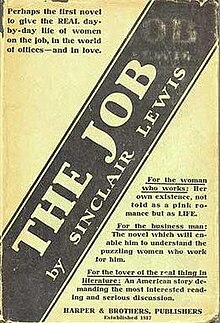 First edition First edition | |
| Author | Sinclair Lewis |
|---|---|
| Language | English |
| Publisher | Harper & Brothers |
| Publication date | 1917 |
| Publication place | United States |
| Pages | 326 pp. |
| OCLC | 29478586 |
The Job is an early work by American novelist Sinclair Lewis, considered an early declaration of the rights of working women. The focus is on the main character, Una Golden, and her desire to establish herself in a legitimate occupation while balancing the eventual need for marriage. The story takes place in the early 1900-1920s with Una moving from the small Pennsylvania town of her youth to New York to pursue education, only to leave school and enter the workforce when her family can no longer afford to pay tuition.
Initially taking a secretarial job, Una shows a talent for the traditional male bastion of commercial real estate and becomes the first female realtor employed by her firm. On a parallel track, her quest for traditional romance and love is important but her unique role as a working woman, doing a man's job, makes it tough to find an appropriate suitor.
Una is on track to marry Walter Babson, who appears to be a good man but lacks the excitement of her eventual husband, Edward Schwirtz. He is a salesman with all the charm necessary to win her heart, but the marriage is doomed from the start. Una eventually determines to divorce him, which is also scandalous for the time. As the book closes, Una emerges triumphant in both her career and her personal life.
The novel was published before Lewis achieved any significant fame and provides insights on working women as well as the unique nature (for the time) of having a woman as the lead character.
External links
- The Job at Project Gutenberg
 The Job public domain audiobook at LibriVox
The Job public domain audiobook at LibriVox
| Books by Sinclair Lewis | |
|---|---|
|
This article about a 1910s novel is a stub. You can help Misplaced Pages by expanding it. See guidelines for writing about novels. Further suggestions might be found on the article's talk page. |
This article about an American novel is a stub. You can help Misplaced Pages by expanding it. See guidelines for writing about novels. Further suggestions might be found on the article's talk page. |